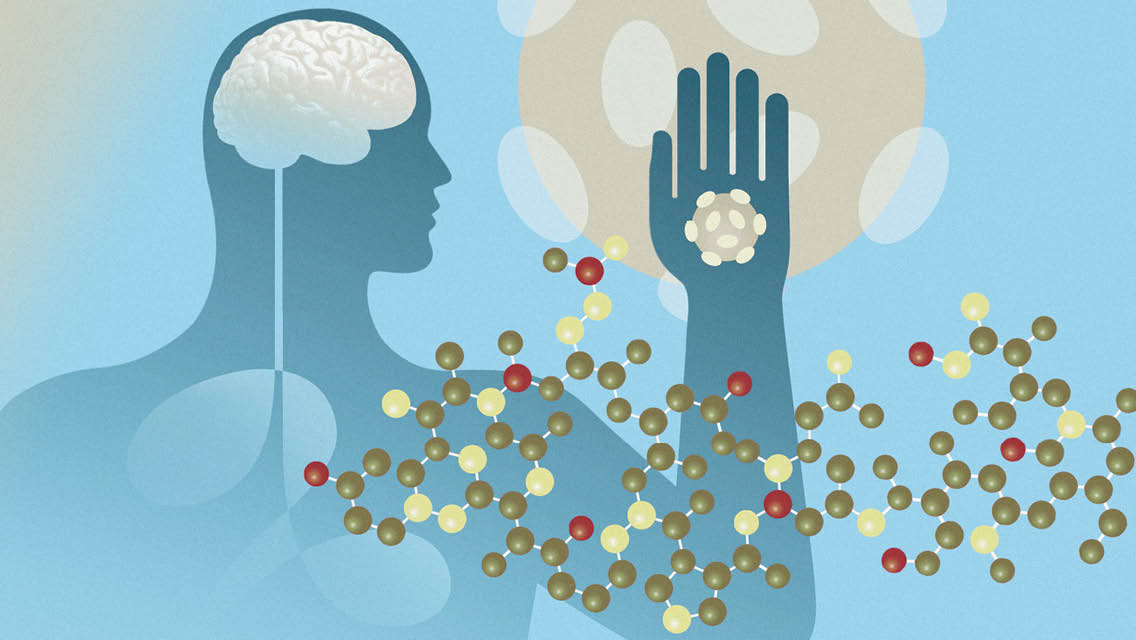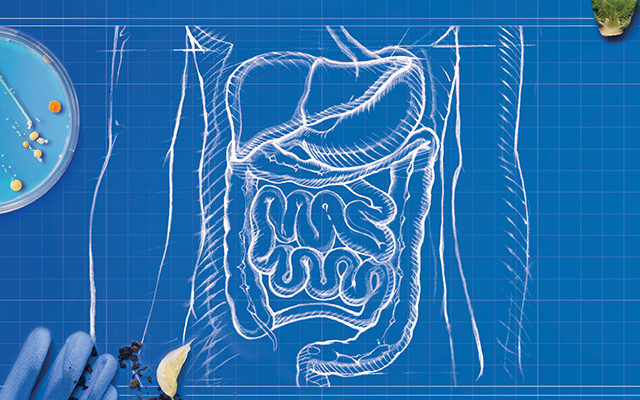Explore this article
- Fatty Acids 101
- Butyrate and the Gut
- Butyrate and the Brain
- Butyrate and the Immune System
- How to Boost Your Butyrate
- Butyrate and COVID-19
Here’s a fact that reads like a riddle: Half of you isn’t you.
Fifty percent of the cells in your body are microbial, and they include fungi, protozoans, viruses, and bacteria. These microbes — known collectively as the microbiome — significantly affect your digestion, immunity, mental health, and more.
Given their supporting role in so many key functions, it’s no surprise that you’re healthier when your microbes are well fed and happy. One way to ensure this is by consuming enough fiber. (See “6 Ways to Eat More Fiber” for ideas to help you amp up your fiber intake.
Fiber is food for gut microbes — and it prompts some of those microbes to produce an important short-chain fatty acid (SCFA) called butyrate.
Also known as butyric acid or butanoic acid, this SCFA contributes to an astonishing number of health benefits, including improved digestion, better detoxification, stronger overall immunity, and reduced risk of cancer.
Lackluster butyrate levels, on the other hand, can contribute to problems in all these areas. “If we don’t have good butyrate levels, then these critical functions are impaired,” explains functional-medicine physician Gregory Plotnikoff, MD.
Butyrate plays a role in so many bodily systems that diagnosing low levels of this molecule can be daunting. A stool test read by a healthcare practitioner trained to recognize optimal and suboptimal levels is the best way to learn if your butyrate production is flagging.
Test or no test, it’s worth doing what you can to boost butyrate on your own. “Butyrate has been overlooked for far too long,” Plotnikoff says. “It is a powerfully protective molecule that is in our power to activate and promote.”
Learn more about how this potent molecule works — and how you can help your body produce more of it.
Fatty Acids 101
You need fatty acids in your diet to support optimal brain and gut health. These molecules are the building blocks of fat — both the fat you eat and your adipose tissue. They consist of chains of carbon atoms with some hydrogen atoms attached, and they come in three sizes: short-chain, medium-chain, and long-chain.
Long-chain fatty acids are most common in animal foods and provide the essential omega-3 fatty acids in coldwater fish, eggs, walnuts, and chia seeds. Medium-chain fatty acids are found in coconut oil and milk fat, and they’ve enjoyed recent acclaim for their role in MCT (medium-chain triglyceride) oil — a key ingredient in Bulletproof coffee.
Short-chain fatty acids are present in foods like butter and cheese, but our gut microbes typically produce most of the SCFAs the body needs. These endogenously produced SCFAs include butyrate, propionate, and acetate, which work together to keep the gut and immune system in working order.
The best way to boost the body’s butyrate production is by supplying the gut with plenty of dietary fiber. Gut microbes break down indigestible fiber and turn it into SCFAs, which are ultimately responsible for the many health benefits associated with fiber: regular bowel movements and overall colon health, right-sized LDL cholesterol levels, steady blood sugar, and stable body weight.
(Insoluble fiber, soluble fiber, and prebiotic fiber are all essential to our health and well-being. Here are “The 3 Types of Dietary Fiber You Need” and a list of what foods contain them).
Butyrate and the Gut
SCFAs also keep the cells that line the colon (called colonocytes) healthy, providing them with their main source of energy. Although butyrate is the least abundant SCFA the body produces, it has a big impact on gut health.
“Colonocytes seem to love chowing down on butyrate, so most of it is taken up by the gut lining, where it contributes to a healthy colon,” notes internal-medicine specialist and gastroenterologist Will Bulsiewicz, MD, MSCI, author of Fiber Fueled.
In a healthy gut, the walls of the large intestine are intact but reasonably permeable. They allow nutrients to enter the system while preventing the escape of bacteria, toxins, and food particles.
When intestinal walls are damaged, they become permeable and “leaky.”
A range of factors can produce this condition, including stress, a low-fiber diet, and food intolerances. A leaky gut usually leads to widespread gut inflammation, which can trigger gastrointestinal (GI) disorders and more. (See “What Is a Leaky Gut?” to learn more about this condition and for a list of telltale symptoms.)
Meanwhile, enhanced butyrate production can build a sturdier gut barrier. “Butyrate fixes up the lining of the gut, like taking a beautiful historic home that’s been run haggard and restoring it to its original glory,” Bulsiewicz explains.
Plotnikoff likens this relationship to the adage that good fences make good neighbors. “Our neighbors — our bacteria — are doing all the maintenance work on this fence that is the gut lining,” he notes. “If they’re not producing butyrate, then the fence is not being cared for, and it becomes rickety and wobbly. It’s not doing the job it needs to be doing.”
One way butyrate protects the gut lining is by keeping inflammation in check, a task that we sometimes outsource to steroids like prednisone, says Plotnikoff. But butyrate helps regulate inflammation without the side effects of these drugs. “It’s in our power to roll back inflammation or to prevent it from even starting when it’s not necessary,” he says.
Notably, research has found a link between inflammatory bowel disease (IBD) and a deficiency of butyrate-producing bacteria in the microbiome, as well as reduced microbial diversity. This may contribute to the overgrowth of an extra-nasty type of E. coli that often appears in the guts of people with IBD.
According to Bulsiewicz, this E. coli unleashes “pro-inflammatory proteins like a flamethrower as it proliferates, further enhancing dysbiosis and the rise of more E. coli.”
Butyrate helps arrest runaway inflammatory processes like these, and supplemental butyrate (in the form of capsules) is sometimes used to treat Crohn’s disease.
Butyrate and the Brain
We now know about the connection between the gut and the brain, so it’s not surprising that butyrate plays a role in cognitive health. Immune cells in the brain become prone to inflammation as we age, leading to impaired cognitive and motor function. The anti-inflammatory powers of butyrate help mitigate that damage.
Studies indicate that butyrate improves learning and memory in older mice. Animal studies also suggest that butyrate may aid in the fight against Alzheimer’s, Parkinson’s, and other neurodegenerative diseases.
Alzheimer’s is associated with an excess of a protein called beta-amyloid in the brain, where it forms masses called plaques. These may interfere with cell function and damage brain and motor function.
In a 2019 study, mice given sodium butyrate supplements experienced significant reduction in beta-amyloid as well as improved cognitive performance.
Other studies link high-fiber diets and better butyrate levels to improved outcomes among participants with a history of Huntington’s disease, autism, or stroke.
Butyrate has also been studied for its effects on depression and other mental-health conditions. A 2021 meta-analysis of 59 studies found that the gut microbiomes of patients with depression, bipolar disorder, psychosis and schizophrenia, and anxiety all showed reduced numbers of anti-inflammatory butyrate-producing bacteria and increased populations of pro-inflammatory bacteria.
Butyrate and the Immune System
Butyrate’s benefits extend beyond the gut and brain to influence your immunity. “Although it remains in the bowel, butyrate’s effects are systemic,” says functional-medicine practitioner Kara Parker, MD, ABIHM, IFMCP. “It’s what’s called an HDAC (histone deacetylase) inhibitor, which means that it goes systemically throughout the body and messages cancer cells to turn themselves off and die.”
The salutary role butyrate plays in the gut may even extend to the health of the lungs, via what’s now being called the “gut–lung axis.” One 2019 study found that children who lacked butyrate-producing flora were more likely to develop asthma and allergies, while children with robust butyrate production were substantially less likely to do so.
Researchers are still unclear about exactly how butyrate contributes to these effects, but it appears to be through regulating immune-cell behavior. In other words, there isn’t much butyrate won’t do to protect your health.
How to Boost Your Butyrate
If you’re eager to increase your own butyrate levels, here are several ways to start.
1. Eat more butyrate-containing foods. Some foods contain butyrate naturally. These include hard cheeses (think Parmesan and pecorino), butter, full-fat yogurt, and fermented foods, such as sauerkraut, pickles, and tempeh.
2. Eat more butyrogenic foods. Certain foods, especially those high in fiber, promote butyrate production in the gut: flax and chia seeds; beans and lentils; high-pectin fruits, such as apples and berries; and vegetables like garlic and onions.
Whole grains are also supportive, and resistant starch from green bananas and cold potatoes helps feed the microbes that make butyrate (for more on resistant starch, see “Resistant Starch for a Healthy Gut“). Parker recommends adding a tablespoon of potato starch to soups or smoothies.
3. Get enough sleep. Rest is a critical factor in butyrate production. “In deep sleep, you repair the gut,” explains Parker.
In turn, optimal butyrate levels also help support sleep. One animal study found that SCFAs send sleep signals to the brain, and that higher butyrate levels increase duration of deep, non-REM sleep.
4. Fast. According to Parker, a fast-mimicking diet (which involves fasting for 12 or more hours) may help raise butyrate levels. “When you stop putting the food in, you stop making the gut do the functions of digestion, and you allow it to switch to absorption and repairing the holes,” she explains. “This helps heal a leaky gut and helps grow more anti-inflammatory bacteria.” (For more on intermittent fasting, see “Everything You Need to Know About Intermittent Fasting“.)
5. Exercise. Studies show that exercise increases butyrate levels in the gut, perhaps because it encourages blood flow to the bowels, says Parker. She cautions against overdoing it, though, because stress can exacerbate gut permeability. “Marathon runners classically have breaches in their intestinal barrier,” she says.
Researchers are still seeking to define the line between exercise levels that improve gut health and stressful extremes that exacerbate permeability.
6. Mind your stress. When the body gets overly stressed for too long, cortisol levels rise, and the hormone is “an inflamer of dysbiosis and a suppressor of a healthy microbiome” that contributes to gut permeability, says Parker. (Learn more about the importance of cortisol and how to manage your cortisol levels at “How to Balance Your Cortisol Levels Naturally.”)
7. Supplement. If you experience gut pain, constipation, or poor sleep, and you already eat a varied, fiber-rich diet, you may wish to work with a healthcare provider to try butyrate supplements.
This can be especially useful if you’ve just finished a course of antibiotics and are having a hard time getting your gut back on track. “For a week of normal antibiotics, it can take up to a year to rebalance the microbiome, so, you’re going to lose some of the players that make butyrate,” Parker explains.
She says most of us will regain those bacteria over time through diet, but sometimes the process is too slow. “If you have severe bowel symptoms — an inflammatory bowel, or acute GI distress — you might want to take some butyrate for a period of time to help reduce that.”
In these situations, Parker may prescribe sodium-butyrate or calcium-butyrate capsules. It is possible to get too much, so she recommends working with a functional-medicine provider to get the right dose.
Butyrate and COVID-19
Butyrate has been found to help reduce inflammation in the lungs as well as the gut, and researchers hope it may help manage complications from COVID. A 2021 study found that symptomatic COVID patients had lower levels of butyrate-producing gut bacteria, which may play a role in the presentation of gastrointestinal symptoms with COVID infection.
Functional-medicine physician Kara Parker, MD, ABIHM, IFMCP, points to a study of healthcare workers in six countries published in 2021. Of the 568 who got COVID, she says, “those who self-reported that they had a plant-based diet [reduced their odds of severe symptoms] by 73 percent. All those plant-based foods are contributing to increased butyrate. And you just have less gut inflammation when you’re eating fewer inflammatory foods.”
More research is needed, yet there’s no downside to upping your intake of vegetables, fruits, and other fiber-rich plant foods. (Learn more about what foods are high in fiber at “The 3 Types of Dietary Fiber You Need“.)
This article originally appeared as “The Little Molecule That Could” in the May 2022 issue of Experience Life.[/vc_column_text][/vc_column][/vc_row]





This Post Has 0 Comments